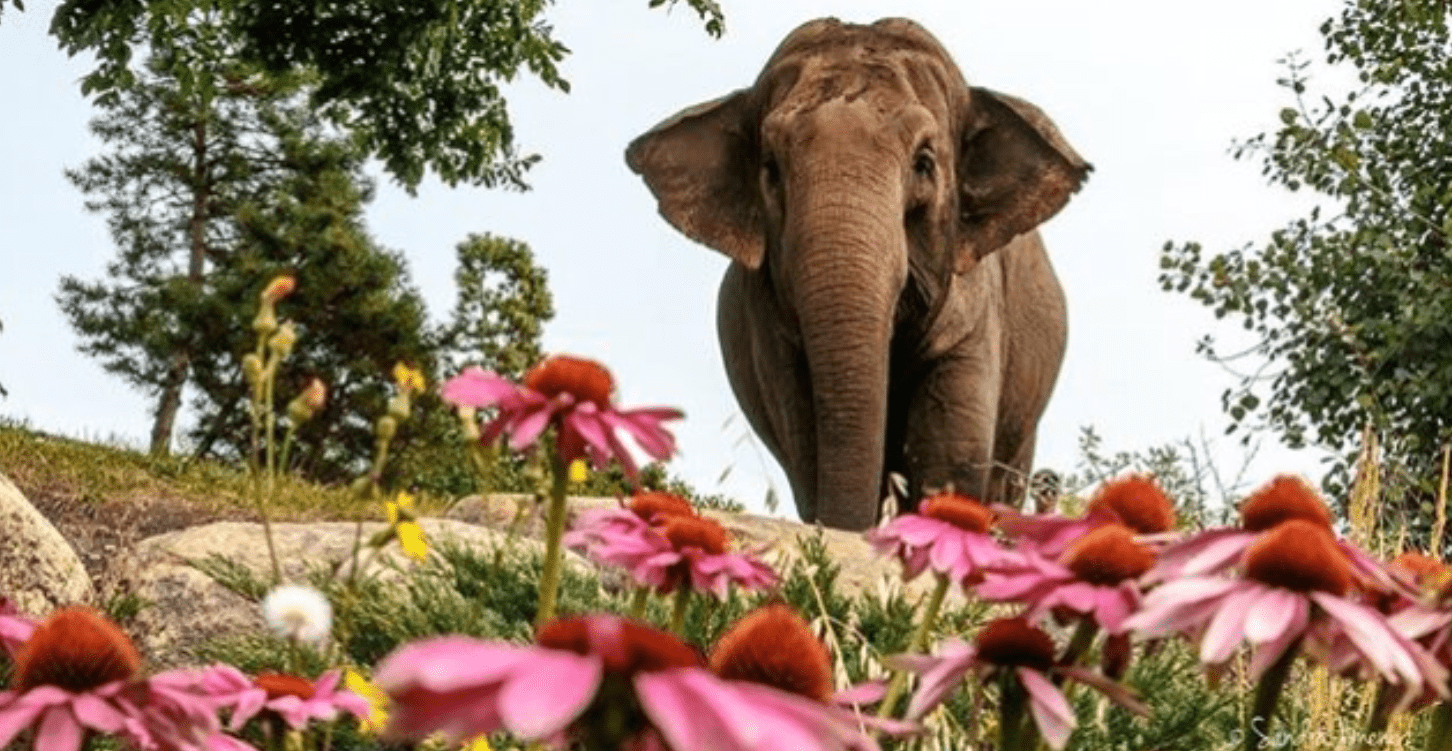Elephants have come into recent global focus after a documentary about a camp in South India, the oldest in Asia, won this year’s Oscar for best documentary short film. ‘Elephant Whisperers’ is a heart-warming story of an elderly couple taking care of an orphaned elephant.
Canada, home to just over 20 elephants, has one special tale to tell too: that of Lucy, a lone, old, and ailing elephant, spending her days with laboured breathing in the Edmonton Valley Zoo where she has lived since 1977. There is no lack of care or affection for Lucy, yet she has been a source of contention.
Wildlife activists have insisted that Lucy be moved to a warmer climate from her one-room shelter in Alberta. But conservationists who have assessed her health assert that she cannot be moved.
Over the years, thousands of people have signed petitions calling for Lucy to be moved to a warmer climate where she can live with other elephants, according to several activist groups and zoo authorities.
In 2012, ZooCheck and People for Ethical Treatment for Animals urged the Supreme Court of Canada to consider Lucy’s fate of being confined to a one-room space. There have been many ‘Save Lucy campaigns’ since. Lucy was the source of a 2017 article in The Guardian titled “The world’s coldest elephant? Activists demand Lucy’s removal from Canadian zoo.”
But a collaborative assessment last October between the Edmonton Valley Zoo and ‘Free the Wild’, an organization that calls for the release of animals in captivity, found that Lucy is not fit to travel. Therefore she will stay at the Edmonton Zoo where she has been cared for more than 45 years.
“She is old and sick,” said Gary Dewar, Director of Edmonton Valley Zoo. “She has a number of ailments and she needs rest.”
Jane Goodall Act
In Canada, wild animals in zoos, as pets, or used as entertainment has been and continues to be questioned and debated. A legislative initiative entitled the Jane Goodall Act was originally introduced in the Canadian Senate by Senator Murray Sinclair in 2020 and was reintroduced by Senator Marty Klyne in March 2022. It proposes to phase out elephant captivity in Canada, similar to a law passed in 2019 which banned the capture and captivity of whales and dolphins.
Lucy, now 47 years old, was brought to Canada as a two-year-old orphan from Sri Lanka. She was lodged in an orphanage before the zoo bought her from a wildlife dealer in 1977. As a two-year old, she was energetic and vivacious and one of the main draws of the 350 animal zoo, Dewar recollected.
Her 240-square-metre barn includes a main room and a secondary exercise enclosure. The main room is concrete, with rubberized walls and floor, to take the stress off her body. “We keep her warm with heaters during winter,” he added.
A group called Friends of Lucy once brought a warm blanket coat for her to wear but the zoo rejected the gift as Lucy would shrug off and rip anything that was put on her, Dewar said.
Still, Dewar said, some headlines that day read: “A furor has erupted over a Canadian zoo rejecting an elephant-sized coat donated for their sole pachyderm Lucy in the midst of a brutal winter…”
Health check-up
Lucy is assessed annually by a team of independent experts. In October the panel made a number of recommendations that the zoo is implementing including changes to Lucy’s diet and medical treatments.
In the four months since the last assessment, Lucy has lost 326 kegs, down from 4,300 kg at the time of the assessment, said Dewar in a phone interview. Lucy has access to food any time of day or night with an auto dispenser in her room supplying hay or fodder.
Her obesity is an ongoing concern, the experts noted in their reports, as it affects her mobility, joints, and pressure sores.
‘We love Lucy’
The medical assessments are done by the zoo in cooperation with Free the Wild.
“I’ve travelled the world and I’ve been to many zoos and sanctuaries and circuses across the globe.What I’ve seen here in terms of commitment from the zoo staff is extraordinary,” said Sagan Cowne, director of communications at Free the Wild, in a news release. “It’s definitely a very good baseline from which any zoo should look to (to care for) their animals.”
Some of the recommendations in their assessment include providing additional space and freedom for Lucy to roam at her leisure, fresh water for bathing and air quality checks to ensure she breathes clean air.
One of the assessors, Patricia London, founder of the Asian Elephant Wellness Project, thought Lucy should be moved to The Elephant Sanctuary (TES) in Tennessee, a two-to-three-day drive from Edmonton.
“At TES she will have the opportunity to have yards that she can graze in, a lake and multiple ponds she can swim in if she wants,” London wrote in her report. “Although most of the elephants’ time is spent outdoors, she will also have access to a large, heated barn with both radiant and floor heat, sand beds, and thick poured rubber flooring in the stalls … The elephants have free access to the yards and stalls so they can decide where they want to be and sleep regardless of weather conditions.”
“The real truth is no one knows how Lucy would do in transport, “ London added. “But we do know that she has suffered and continues to suffer where she is now. This is evidenced by her current physical condition as well as her lack of engagement in her environment – she is not thriving; she is merely surviving … With careful planning and preparation a successful transport for Lucy is very possible.”
People elephant
On its website, Edmonton Valley Zoo calls Lucy a “charming and precocious Asian elephant.” She is often called a ‘people elephant’ and her herd is her zoo family. She simply adores her caregivers who ensure that she’s happy and healthy,” the website reads.
In the beginning Lucy was into entertaining the public, Dewar recalled. She liked painting, blowing the harmonica, and playing hide and seeks and tugs of war. She was also the subject of study for elephant programs, special lectures, animal education, and training. Now that Lucy has been taken off public duties and is in semi-retirement, the public no longer gets to see her.
Today’s zoo standards and the zoo’s own plan preclude adding another elephant.
“We’ve decided Lucy will be the last elephant in this zoo,” Dewar said.
Gita Abraham is a journalist of 45-year standing and has worked in national dallies and magazines in New Delhi including Hindustan Times and India Today. For 15 years she was the Feature Editor of The City TAB in Bangalore. She was also a Professor of Journalism, at the Asian College of Journalism in Chennai. Treading the thin line between fact and fiction, Gita has launched her debut novel “Daughter of the Blue Hills” early this year. She and her husband are snowbirds shuffling between Chennai and Ottawa. She has two daughters and two frisky grandsons who inhabit her world.






The conditions in a zoo are never going to be adequate for an elephant. Elephants are migratory and intelligent and family oriented animals. She should have been moved to a sanctuary a long time ago.